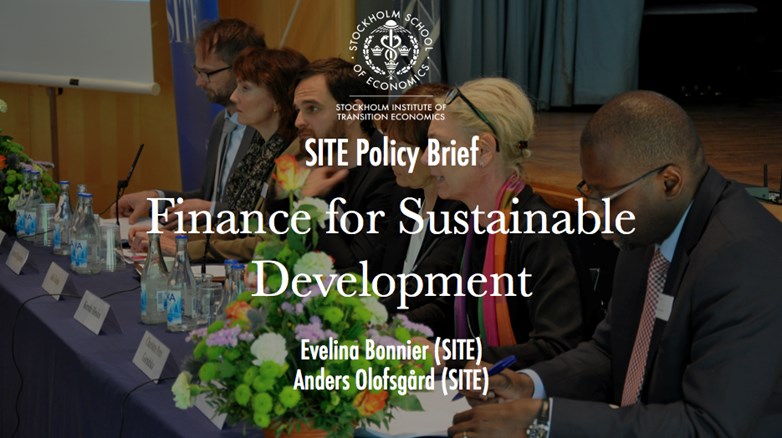Distinguished scholars and practitioners discuss finance for sustainable development
The policy brief serves as a resume for the ideas and research findings discussed during the conference "Finance for Sustainable Development" that was organized jointly by the Stockholm Institute of Transition Economics (SITE) and the Swedish Ministry for Foreign Affairs. This event was the fifth installment of Development Day – a yearly development policy conference and it brought together a distinguished and experienced group of policy-oriented scholars and practitioners from government agencies, international organizations, civil society and the business community.
The policy brief covers various topics including the Millennium Development Goals set by the United Nations, the changing landscape of private aid for developing countries, questions regarding incentives necessary to facilitate private investment in low-income countries and instruments on how to reduce poverty in fragile states. Authors of the policy brief describe the rapidly changing field of private aid. New bilateral donors, multilateral funds and private donations are coming up the stage of development finance. New actors offer new sources of revenues and they have been found to make more use of local knowledge, thus lowering administrative and overhead costs.
Private investment in developing countries is also seen as an effective financial instrument particularly in the areas of infrastructure, and social sectors such as education and health. In the policy brief authors explain what kind of incentives can attract private companies and institutional investors into areas what are largely public goods and services, in relatively high risk environments. During the conference "Finance for Sustainable Development" Theo Talbot from the Centre for Global Development discussed the existing private investment instruments available for using official development assistance to leverage private investments and offered suggestions for how to improve the existing portfolio of instruments. His comments on talk "Paying for Success: Catalysing Private Investment for Development" delivered at the conference are available on SITE's YouTube channel.
Another topic discussed by the authors in the policy brief is fragile states and instruments that can reduce extreme poverty in this type of countries. One such promising instrument is remittances. Flows of remittances have been increasing in relative importance, and are now comparable in magnitude to foreign direct investment. During the conference professor Dean Yang from the University of Michigan gave a talk "Migration, Remittances and Economic Development". Professor Yang discussed existing evidence on the development impact of migration and remittances, as well as some evidence on how to boost the development impact of remittance flows. Professor's comments on his talk "Migration, Remittances and Economic Development" are available on SITE's YouTube channel.
The policy brief also provides insights about different incentive schemes such as guarantees and concessional loans or such instrument as paying for success. Read more about conclusions on how development finance could be encouraged to reduce poverty in the policy brief "Finance for Sustainable Development" here or read it on our SlideShare channel below.




